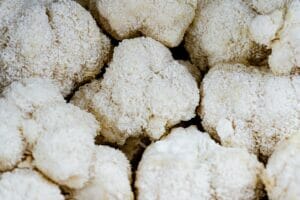Lion’s Mane, also known as “Hericium erinaceus”, is a remarkable mushroom that boasts numerous health benefits. In recent years, it has gained popularity in the health and wellness community due to its potent neuroprotective and anti-inflammatory effects. This culinary delicacy has been used for centuries in traditional Chinese medicine for its medicinal properties, particularly in improving cognitive function and enhancing stamina. However, not everyone knows where to find this incredibly beneficial mushroom or how they can incorporate it into their daily diet naturally. In this article, we will explore various food sources of Lion’s Mane and highlight different ways to get it naturally in your diet.
Growing Lion’s Mane Mushrooms: A Beginner’s Guide
Growing Lion’s Mane mushrooms can be a simple and rewarding process that even beginners can accomplish. These fungi typically grow on hardwood trees, and they require specific environmental conditions like humidity, temperature, and proper lighting to thrive. You can either buy a mushroom growing kit or start from scratch by getting the necessary supplies such as spores or plug spawn, substrate (such as sawdust), specialized containers and tools. Keep in mind that cultivating Lion’s Mane requires patience as it takes several weeks for the mycelium to colonize fully.
 Once you have successfully grown your own Lion’s Mane mushrooms, there are various ways you can incorporate them into your diet. You could sauté them with other vegetables or greens to make an exotic stir-fry dish; grill or roast them for added flavor; blend them into smoothies with fruits; bake lion’s mane mushroom cookies among many other options.
Once you have successfully grown your own Lion’s Mane mushrooms, there are various ways you can incorporate them into your diet. You could sauté them with other vegetables or greens to make an exotic stir-fry dish; grill or roast them for added flavor; blend them into smoothies with fruits; bake lion’s mane mushroom cookies among many other options.
The taste is likened to seafood-like flavors making this fungi ideal for vegetarians who want something reminiscent but not actual seafood ingredients within their plant-based meals while also taking advantage of possible anti-inflammatory brain health benefits attributed to it.
Overall, incorporating Lion’s Mane mushrooms into one’s diet shouldn’t feel daunting once you get past the initial learning curve of cultivating these fantastic fungi on your own using natural methods heard about via online guides-videos then applied entirely! At times research alone does wonders hence Reading informative articles/newsletters concerning foods high in super nutrients never hurts- so long as nutritionists approve!
The Health Benefits of Lion’s Mane: What Science Says
Lion’s Mane mushroom is a nutritional powerhouse that provides several health benefits. Scientific research shows that this fungus has potent antioxidant and anti-inflammatory properties, which protect the brain from neurological damage caused by oxidative stress. It is also rich in polysaccharides, which improve immune function and prevent chronic diseases such as heart disease, diabetes, and cancer.
Apart from boosting cognitive function and stamina, Lion’s Mane mushroom also supports gut health by promoting the growth of beneficial bacteria in the digestive tract. This nutty-flavored delicacy can be consumed raw or cooked with other ingredients to make delicious meals. By including Lion’s Mane mushroom into your regular diet naturally through its food sources such as on soups or supplementing with it you could enjoy a plethora of health benefits for years to come.
Where to Buy Lion’s Mane Mushrooms: Finding Quality Sources
Lion’s Mane mushroom is a valuable addition to any healthy diet. It contains numerous bioactive compounds that benefit cognitive health, boost the immune system and protect against oxidative stress. However, not all Lion’s Mane mushrooms are equal in quality. When looking to buy this superfood, it is important to ensure that you purchase from reputable sources that are known for their high-quality products. You can start by checking online stores or your local health food shops for certified organic Lion’s Mane mushrooms.
Another option when sourcing top-grade Lion’s Mane is to grow your own at home. This way, you have complete control over its growth and know exactly how fresh the product is before consumption. Many people find growing their own herbs, fruits and vegetables rewarding and cost-effective in the long run; Lion’s mane mushroom kits are available at many garden stores across North America.
Overall, finding quality sources of Lion’s Mane mushrooms involves doing research on suppliers’ credibility while considering personal needs such as price-point or preference between fresh or dried–at-home harvesting options could also be weighed depending on individual circumstances.
Cooking with Lion’s Mane: Delicious Recipes to Try
Cooking with Lion’s Mane: Delicious Recipes to Try is a wonderful resource for those looking to incorporate this mushroom into their diet. The book includes over 50 recipes that showcase the unique flavor and texture of Lion’s Mane, from soups and stews to salads and sandwiches. Some standout dishes include a creamy mushroom risotto, a hearty mushroom burger, and even a vegan-friendly “crab” cake made with Lion’s Mane mushrooms.
 Not only are these recipes delicious, but they also provide numerous health benefits.
Not only are these recipes delicious, but they also provide numerous health benefits.
As mentioned in the introduction, Lion’s Mane has been shown to have potent neuroprotective and anti-inflammatory effects, making it an excellent addition for anyone looking to improve their cognitive function or overall wellbeing.
By incorporating this valuable ingredient into your cooking repertoire, you can create flavorful meals while reaping its incredible health benefits.
Lion’s Mane Tea: A Simple and Effective Way to Get More of This Mushroom
Lion’s Mane tea is a simple and effective way to get more of this amazing mushroom into your diet. As its name suggests, Lion’s Mane tea is made by steeping dried Lion’s Mane mushrooms in hot water for a few minutes. This produces a fragrant and flavorful brew that can be consumed at any time of the day.
In addition to being delicious, Lion’s Mane tea has several health benefits. Studies have shown that it may improve cognitive function, boost immunity, reduce inflammation, and promote overall wellness. Moreover, it is easy to make and can be enjoyed by anyone who wants to incorporate this functional food into their daily routine.
If you are looking for an easy way to add more nutrients to your diet without resorting to supplements or expensive superfoods, consider trying Lion’s Mane tea today. Whether you prefer it hot or cold, brewed with black tea or blended with other herbs like ginger or lemongrass – there are many ways to customize the flavor of this versatile beverage so that you can enjoy all the benefits of this amazing mushroom without sacrificing taste!
Supplements and Extracts: Are They Worth the Investment?
Supplements and extracts have become increasingly popular as people seek to enhance their health. While some supplements may provide benefits, it is important to consider if they are worth the investment. Many supplements lack rigorous scientific evidence supporting their claims of effectiveness. Additionally, supplements can interact with medications or cause side effects in some individuals.
When it comes to obtaining nutrients like Lion’s Mane, it may be more beneficial to look for natural food sources rather than relying on supplements or extracts. Incorporating whole foods into a balanced diet can not only provide necessary nutrients but also additional benefits from other compounds within the food.
Ultimately, whether or not supplements and extracts are worth the investment depends on each individual’s needs and circumstances. It is important to discuss any supplement use with a healthcare provider before starting them and thoroughly researching potential risks and benefits. Considering natural food sources should also be explored as an alternative option for obtaining essential nutrients.

Lion’s Mane Safety: Potential Risks and Precautions to Consider
While Lion’s Mane is generally considered safe for consumption, there are potential risks and precautions to consider. People with allergies to mushrooms should avoid consuming it or any related species. In addition, individuals who are pregnant or breastfeeding should consult with a healthcare professional before incorporating Lion’s Mane into their diet.
Another precaution to keep in mind is that some vendors may sell Lion’s Mane products contaminated with heavy metals like lead and cadmium due to environmental pollution. It’s essential to purchase from reputable sources that have strict quality control measures in place.
Finally, Lion’s Mane may interact with certain medications such as blood thinners and immunosuppressants. Therefore, it’s crucial to discuss its use with a doctor if you’re taking any prescription medication or have an underlying medical condition before adding it to your diet.
In Summary:
Lion’s Mane, a unique mushroom species known as the Hedgehog or Yamabushitake mushroom, has long been recognized for its potential health benefits. Lion’s Mane Mushroom benefits are many, from easing anxiety and depression to providing nutritional support.
One can consume this functional mushroom in various forms.
Health food stores carry Lion’s Mane in capsule form, such as Lion’s Mane Mushroom supplements.
Or as a mushroom powder, making it easy to integrate into your daily diet.
There’s also the option of a mane supplement, Lion’s Mane Mushroom extract, and even an organic Lion’s Mane extract for a more concentrated dosage.
Many mushroom recipes incorporate fresh Lion’s Mane mushrooms, as they are generally easy to use. If you have mushroom growing experience, you can even find Lion’s Mane mushrooms to cultivate at home. However, for a quick and easy dose of this beneficial fungus, consider taking Lion’s Mane supplements or using Lion’s Mane powder.
Research suggests that Lion’s Mane can help reduce depression and anxiety. For instance, one study showed that mice fed a high-fat diet, supplemented with Lion’s Mane, exhibited fewer signs of anxiety and depression.
The Food and Drug Administration acknowledges the potential benefits of the Lion’s Mane mushroom. It contains bioactive compounds that may contribute to its medicinal properties. Further research on Lion’s Mane, such as studying the activity of Lion’s Mane extract in humans, could solidify its reputation as a powerful health ally.
However, before integrating Lion’s Mane into your routine, ensure you understand how much Lion’s Mane to take and consider any potential effects of Lion’s Mane. As always, consult a healthcare professional for personalized advice.
Common Questions:
Q: What is Lion’s Mane?
A: Lion’s Mane is a medicinal mushroom that has been used for centuries in traditional Chinese medicine for its potential health benefits. It is scientifically known as Hericium erinaceus and is commonly found in Asia, North America and Europe.
Q: What are the potential health benefits of Lion’s Mane?
A: Lion’s Mane mushroom is believed to have many health benefits, including promoting brain function, aiding digestion, reducing inflammation, treating anxiety and depression, and boosting the immune system.
Q: Is Lion’s Mane available in supplement form?
A: Yes, Lion’s Mane is available in supplement form, including capsules, powder, and extracts. These supplements can be found in health food stores or purchased online.
Q: What is the recommended dosage of Lion’s Mane supplement?
A: The recommended dosage of Lion’s Mane supplement varies depending on the product and its concentration. It is important to follow the dosage instructions on the label or to consult with a healthcare professional before use.
Q: Can Lion’s Mane mushroom be consumed as a food?
A: Yes, Lion’s Mane mushroom can be consumed as a food. It is often added to dishes in Asian cuisine and can be found in specialty grocery stores. It can also be eaten fresh or cooked at home.
Q: What are some potential recipes that use Lion’s Mane mushroom?
A: Some popular recipes that use Lion’s Mane mushroom include stir-fries, soups, salads, and sautés. It can also be used as a meat substitute or added to pasta dishes.
Q: Is Lion’s Mane mushroom safe for consumption?
A: Lion’s Mane mushroom is generally considered safe for consumption, but it is important to purchase from reputable sources and to avoid consuming it if you have any allergies or underlying medical conditions. As with any supplement or food, it is important to consult with a healthcare professional before use.
Q: Are Lion’s Mane supplements regulated by the Food and Drug Administration?
A: Lion’s Mane supplements are not currently regulated by the Food and Drug Administration, but reputable manufacturers will often follow good manufacturing practices to ensure quality and safety.
Q: What are some other mushroom species that are used for their potential health benefits?
A: Some other mushroom species that are used for their potential health benefits include reishi, chaga, and cordyceps. These mushrooms are also available in supplement form.
Q: What sets Lion’s Mane apart from other functional mushrooms?
A: Lion’s Mane mushroom is unique in that it contains compounds that promote nerve growth and stimulate the production of nerve growth factor. This makes it a popular choice for promoting brain function and treating nervous system disorders.



 How Can I Increase My Lion’s Mane Fast: Lions Mane Mushroom
How Can I Increase My Lion’s Mane Fast: Lions Mane Mushroom
